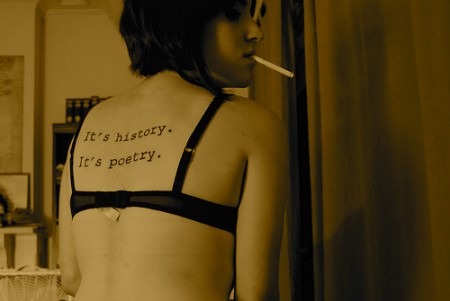I’m an advocate for the belief that living a rich and remarkable life largely depends on taking risks and catching chances. It makes complete sense that we can never get anything different to what we have unless we first change some element of what we’re doing. Last week I asked you for your thoughts regarding when is too soon to consider moving in with a partner and during the week we decided, after much deliberating, reading, talking, umming and ahhing that we’re going to give it a shot. Like many of you pointed out, living together will either force a making or a breaking, and I have a good feeling. Of course, this is a big deal for me and I’m a little bit afraid. Still, this year was always going to be about pushing comfort zones, embracing vulnerabilities and taking the less obvious path, so this is just one of the ways in which I’m realising that objective.
As is often the case, once a decision is made, things seem to move quite quickly. Already we’ve been accepted for a cute little unit that we inspected on the weekend and we’ll be picking up the keys on Friday. We also made our first joint purchase; a rug for our living room floor. It really is exciting times. : )
When I moved to Melbourne at the beginning of January it was without a plan. No one can tell the future and it’s harder still when you’re at a total loss regarding what you might want for yourself. All I knew was that I wasn’t happy with what I had and I needed to do something about it before my battered spirit was damaged irreparably. I suppose I imagined that if I threw it all in and sought a clean slate, some magic might happen.
Six months and countless ups and downs later, I suppose that’s exactly what’s occurred. After some radical twists I’ve started paving myself an altogether different path to the one I was aimlessly wandering in 2011. When I reflect on the year to date, I think the biggest difference between my now and my then is that I’ve awarded myself a most precious gift: the permission to seek change.
For so many years I knew what I wanted to do (or rather what I didn’t want to do), but I lacked the courage to act. I don’t know what I was afraid would happen; perceiving it from my present state of mind, it’s hard to understand how I could have thought quitting my job and moving interstate would potentially herald the end of the world. But I guess at the time it was my fear of the unknown that was holding me to ransom. For whatever reason, back then I didn’t feel free.
In the last six months I’ve come to realise that one way or another, things will always work out. Also, you shouldn’t ever be afraid of failing because there is no such thing. Rather, there are simply limitless turning points that when taken will inevitably lead us in varied directions. And there are lessons. By golly, are there lessons.
In this life we can choose to remain on the one road, safe in the knowledge that we’re familiar with its contours and what might be over each rise, or we can take a chance and mosey off in a new and different direction. Sure, it might be risky, but there are sure to be wonderful things to see and to do. As for myself, let me always be the brave explorer. Because there is always that chance that the things we uncover really might be golden.




